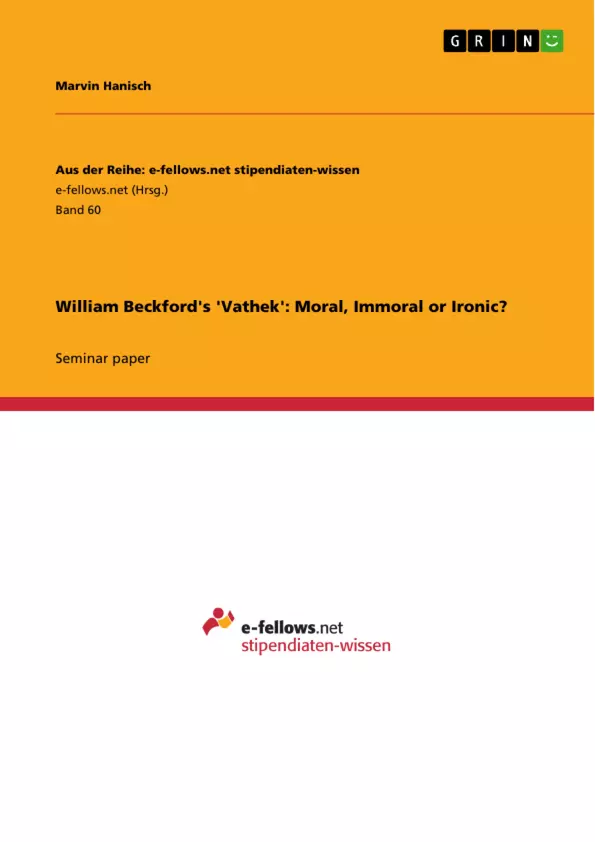Die vorliegende Arbeit behandelt den Gothic Novel "Vathek" von William Beckford und analysiert die ambivalenten Moralvorstellungen in dem Roman, die insbesondere durch den Erzähler geprägt werden. Dabei wird der Text auf seine moralphilosophische Positionierung untersucht und kommt zu dem Schluss, dass es sich bei Beckfords Erzählung um eine ausgeklügelte "Auto-Satire" handelt. Die Interpretation wird in umfassendere Kontexte (Zeitalter der Aufklärung und Gattungsgeschichte der Gothic Novel) eingebettet.
Inhaltsverzeichnis (Table of Contents)
- Introduction: Vathek and the Question of Morality
- Moral Philosophy in the Age of Enlightenment
- Morals in Early Gothic Fiction
- Morals in Vathek
- The Narrative Situation and the Implications for Morality in Vathek
- Religion in the Context of Enlightenment Philosophy
- The main protagonists and the Age of Enlightenment
- Vathek and Christian Values
- Vathek's and Carathis' Amoral Conduct
- The Role of Sexuality and its Moral Implications
- Summary: Morals in Vathek
Zielsetzung und Themenschwerpunkte (Objectives and Key Themes)
This term paper aims to analyze the role of morality in William Beckford's Vathek and determine whether the narrator ridicules the moral concepts of the time or whether the severe judgment of the protagonists is genuinely serious. The study examines the interplay of morality and irony in the novel, exploring how the story's narrative situation, religious context, and portrayal of sexuality contribute to its moral implications.
- Moral Philosophy in the Age of Enlightenment
- Morality in Early Gothic Fiction
- The Role of Irony and Sarcasm in Vathek
- The Interplay of Morality and Sexuality
- The Significance of Religious Context in the Novel's Moral Landscape
Zusammenfassung der Kapitel (Chapter Summaries)
The introduction sets the stage by defining the novel's moral question, drawing connections to the historical and literary context. Chapter 2 delves into the moral philosophy of the Enlightenment, highlighting the key concepts and figures that influenced the era, including Immanuel Kant and Adam Smith. Chapter 3 explores the role of morality in early Gothic novels, demonstrating how authors like Horace Walpole and Ann Radcliffe used moral themes to convey their messages. Chapter 4 dives into the complexities of morality in Vathek, examining the narrative situation, the novel's religious context, and the protagonists' amoral conduct. The chapter concludes with a discussion of the moral implications of sexuality in the story.
Schlüsselwörter (Keywords)
The main keywords and focus topics of the text include morality, irony, sarcasm, Gothic fiction, Enlightenment philosophy, religion, sexuality, and the Age of Enlightenment. The paper explores the intersection of these concepts in William Beckford's Vathek, analyzing how they shape the novel's moral landscape and its enduring relevance.
Frequently Asked Questions
Is William Beckford's 'Vathek' a moralistic novel?
The paper argues that 'Vathek' is an elaborate "auto-satire" rather than a straightforward moral tale, using irony to challenge the moral concepts of its time.
How does the narrator influence the morality of the story?
The narrative situation is characterized by irony and sarcasm, which complicates the severe judgment passed on the amoral protagonists.
What is the role of Enlightenment philosophy in the novel?
The work examines how Enlightenment figures like Kant and Smith influenced the moral landscape that Beckford both reflects and ridicules.
How is sexuality treated in 'Vathek'?
The analysis explores the interplay between sexuality and its moral implications, showing how it contributes to the amoral conduct of characters like Vathek and Carathis.
What distinguishes 'Vathek' from early Gothic fiction like Walpole's work?
While early Gothic fiction often used moral themes seriously, Beckford's work is seen as a more ambivalent and ironic take on the genre's conventions.
- Citation du texte
- Marvin Hanisch (Auteur), 2011, William Beckford's 'Vathek': Moral, Immoral or Ironic?, Munich, GRIN Verlag, https://www.grin.com/document/174374



